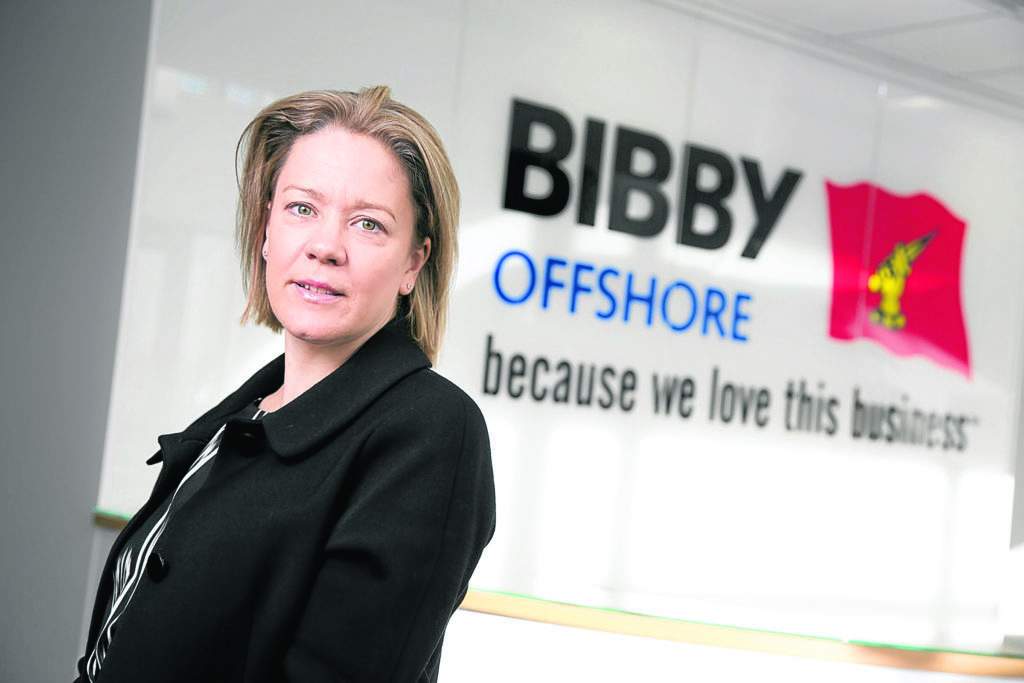
Nicky Etherson, commercial director of Bibby Offshore, chats to P&J Recruitment about her role.
Q. Can you give us an insight into your career and education?
A. As with many people in the oil and gas commercial community, I have a degree in quantity surveying from Aberdeen’s Robert Gordon University. One attraction to this particular course was that it came with the opportunity to work hands on in industry, with each student undertaking a year’s work placement. I was lucky to secure a place with Rockwater Offshore Contractors, now part of Subsea 7, making this my first step into the energy sector.
When I left university the sector was in a downturn, so I headed into the building and civils industry for a couple of years. An opportunity then arose at Coflexip Stena (now Technip) and I was lured back into the sector as a contracts engineer. I spent 10 years with Technip, working in both the tendering and operations departments in a variety of roles – latterly in the role of commercial manager. Over the next couple of years, I moved to Amec and Stolt/Acergy where I was presented with the opportunity to broaden my management experience, not only in the commercial field but also technically. I then enjoyed a number of years with Total E&P in Aberdeen, which was a fantastic learning experience.
In 2013, I was asked if I would like to be considered for a new role at Bibby Offshore as commercial director – an opportunity I knew I could not turn down.
Q. What made you choose this career path?
A. When I went to university I was adamant that I didn’t want to join the oil and gas industry, hence my degree choice. However, my student placement opened my eyes to the opportunities in the sector, which were wider than those in the building or civil engineering sector – particularly for those following a commercial career path. This view was reinforced during my time in the building sector, which although it was great fun, seemed to be limited. The oil and gas sector offered broader prospects.
Q. You were recently re-appointed to Subsea UK’s board – what does this role involve and how do you feel being part of a prestigious industry body?
A. Working with the other members of the Subsea UK board once again broadens the horizon, as we each work for a range of member companies who have different drivers. We set these aside to work together for the common interest of all member companies.
This is no small task as the Subsea UK membership ranges from oil and gas major operators to small single person start-up/incubator companies covering a range of sectors including offshore renewables across the whole of the UK – not just here in the north-east of Scotland.
I feel honoured to have been voted on to the board and would encourage anyone to take up an opportunity to work with an industry body such as Subsea UK. I am also a keen advocate of using industry body membership to enhance your business; be that from having someone lobby government on behalf of the sector, or assisting you in international growth opportunities.
Q. What challenges have you faced during your career?
A. I have been very fortunate in that I don’t consider I have faced any challenges in my career; if anything the opposite, as I have always had strong support from the companies I have worked for.
Q. What are your thoughts on how women are perceived in the industry?
A. I think that there is less differentiation between men and women than there used to be. Women are working in the sector both onshore and offshore, in roles which may have previously been viewed as male domains.
There are female offshore installation managers, marine crew, dive support crew, engineers and air divers; the numbers of women in these roles may not match the number of men, but the balance is improving.
Q. What do you enjoy most about your current role?
A. I really enjoy the diversity. One minute I can be helping one of the team work through a set of contracting terms and the next I could be contributing to global future business strategies.
My current role has given me the opportunity to be actively involved in running and developing a business not only in the UKCS, but in international markets, which brings the added challenges of not only time and language barriers, but also understanding and respecting cultural differences.
Q. What advice would you give to encourage other women trying to make their way in the industry?
A. Although the sector is often portrayed as being in decline, especially with the advent of alternate forms of energy, I view this as an exciting time in the energy story.
The opportunities in deeper water environments, pushing the boundaries to extract every last barrel from the mature provinces, development of the tidal and wind sector, as well as the new challenges which decommissioning presents will provide career opportunities for many years to come. After all, the human race needs energy in one form or another to survive.
The fundamental thing I would say is that there may be challenges (not barriers), every career path has them regardless of your gender, but the important thing is to learn from them and build on them.
If you want to pursue a career in the sector, just do it and enjoy the journey.
Recommended for you
